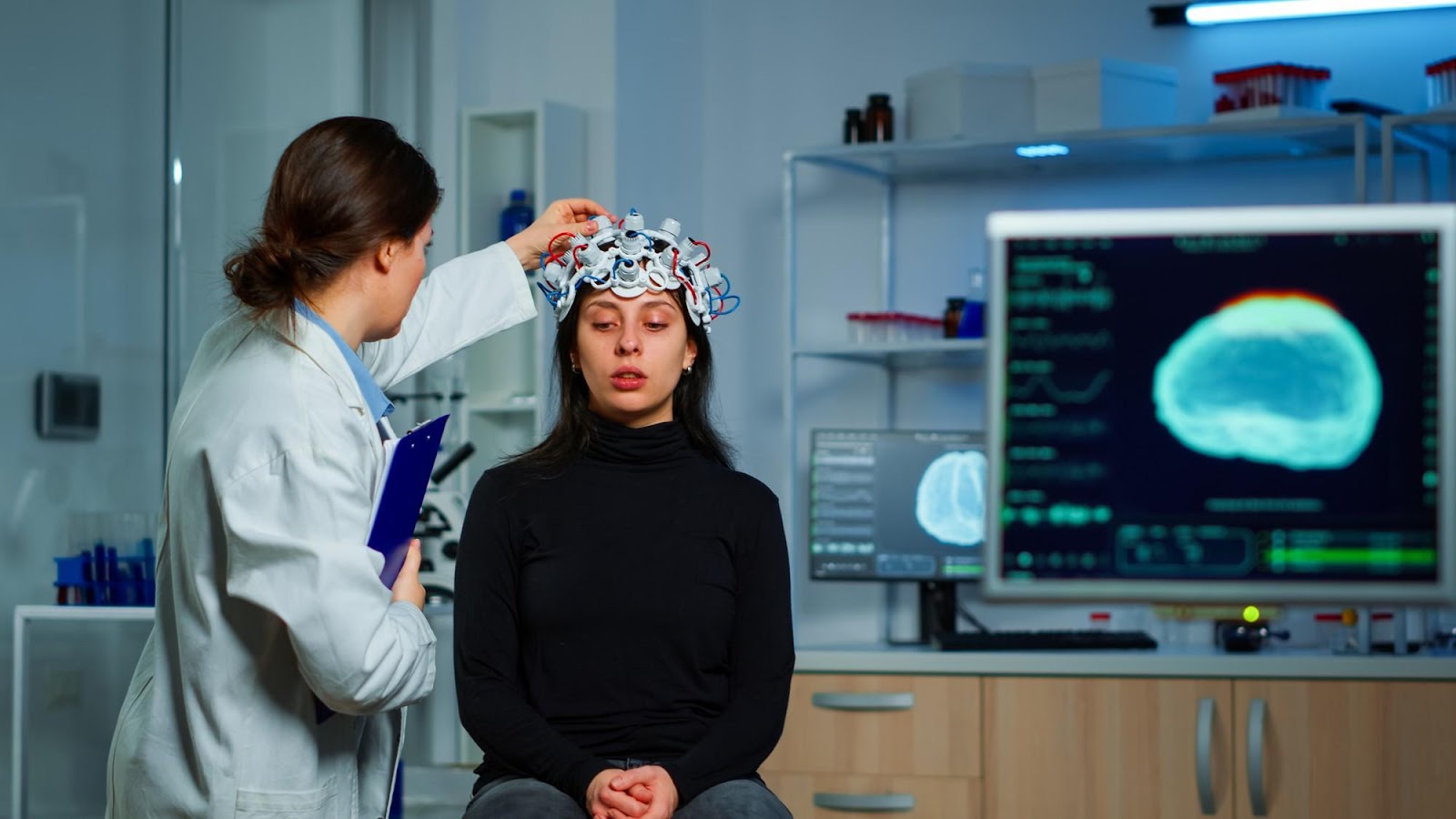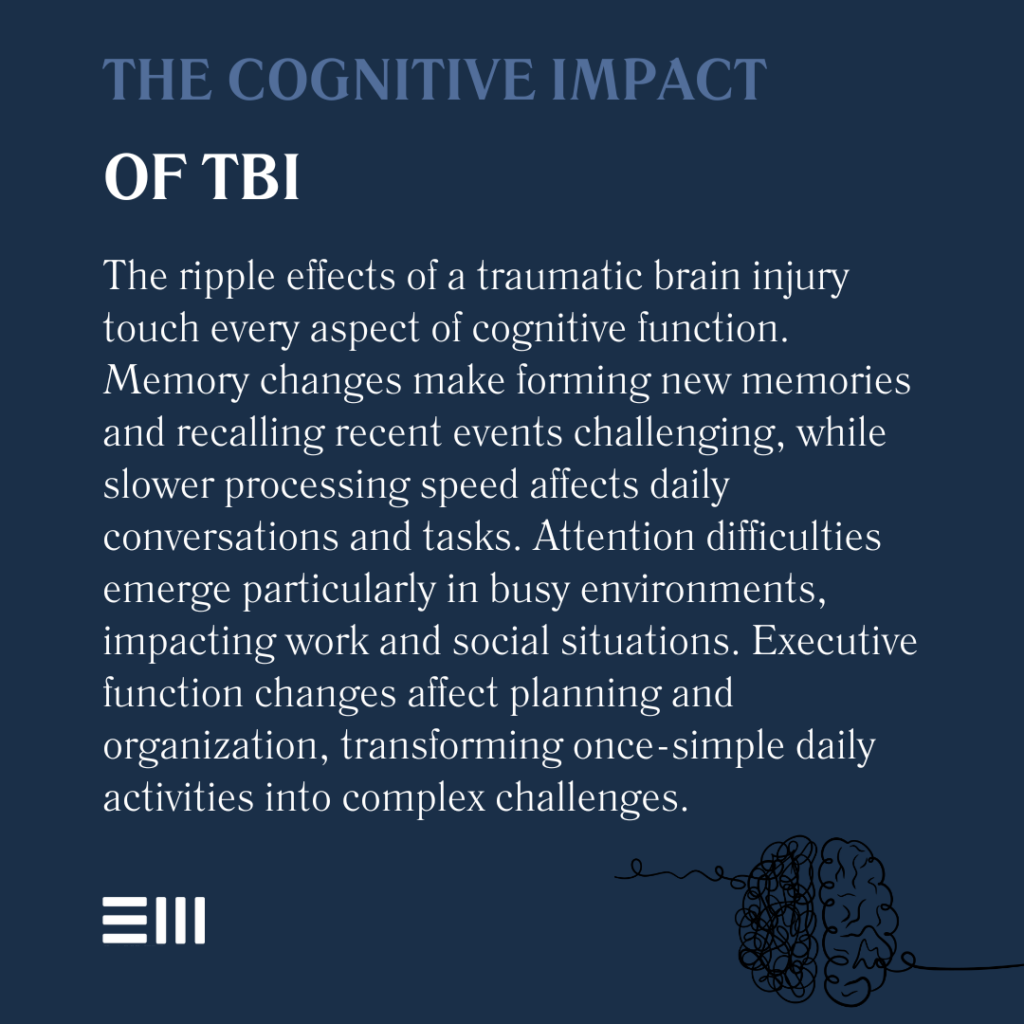
Every 21 seconds in the United States, someone sustains a traumatic brain injury—that’s over 1.5 million Americans annually.
Behind each of these statistics lies a unique story of challenge, resilience, and the potential for recovery through cognitive rehabilitation.
As neuroscience advances reveal the brain’s remarkable plasticity, innovative therapeutic approaches are transforming the landscape of TBI recovery, offering new hope and pathways to reclaiming cognitive function.
Understanding the Cognitive Impacts of TBI
The journey through TBI recovery begins with understanding how these injuries affect cognitive function.
Recent research from the CDC shows that even mild traumatic brain injuries can cause significant changes in attention, memory, and executive function.
These changes can impact daily activities, from managing medications to maintaining employment, making comprehensive rehabilitation essential for recovery.
Common cognitive challenges after TBI include:
- Memory difficulties, particularly with forming new memories and recalling recent events;
- Attention and concentration problems, especially in busy or noisy environments;
- Executive function challenges, affecting planning, organization, and problem-solving;
- Processing speed changes, making it harder to keep up with conversations or tasks;
- Language and communication difficulties, including word-finding problems; and
- Visual processing issues, affecting reading comprehension and spatial awareness.
The impact of these challenges extends beyond individual cognitive functions, affecting relationships, work performance, and overall quality of life. Understanding these effects is the first step toward effective rehabilitation and support.

Modern Approaches to Cognitive Rehabilitation
The field of cognitive rehabilitation has evolved significantly in recent decades.
Current evidence-based rehabilitation strategies include:
- Computer-based cognitive training programs targeting specific cognitive domains;
- Strategy training for developing compensatory techniques;
- Real-world task practice in controlled environments;
- Virtual reality applications for safe skill practice;
- Group therapy sessions for social cognitive skills;
- Mindfulness and meditation techniques for attention training; and
- Physical exercise programs combined with cognitive tasks.
Research shows that early intervention and consistent participation in rehabilitation activities significantly improve outcomes. The key lies in creating individualized programs that adapt to each person’s specific needs and progress.
Building a Support Network
Recovery from TBI requires more than just medical intervention.
Essential components of a comprehensive support system include:
- Family members and caregivers trained in cognitive support strategies;
- Professional healthcare providers coordinating care;
- Support groups connecting survivors with shared experiences;
- Community resources for ongoing assistance;
- Vocational rehabilitation specialists for work reintegration;
- Mental health professionals addressing emotional adjustment; and
- Case managers helping navigate healthcare systems.
Creating and maintaining these support networks helps ensure consistent progress and provides emotional backing during challenging times.
Frequently Asked Questions About TBI Recovery
Understanding the recovery process raises many questions for survivors and their families.
Here are answers to common concerns about cognitive rehabilitation after TBI.
How Long Does Cognitive Recovery Take After a TBI?
Recovery timelines vary significantly based on injury severity, individual factors, and rehabilitation engagement. While most rapid improvements occur in the first six months, many survivors continue to show progress years after injury with appropriate support and intervention.
What Role Does Insurance Play in Cognitive Rehabilitation?
Most health insurance plans cover medically necessary cognitive rehabilitation services. Coverage varies by policy, but many plans include both inpatient and outpatient rehabilitation services when prescribed by a physician.
Can Someone Return to Work after a TBI?
Many people successfully return to work after TBI, though some may need accommodations or modified duties. Vocational rehabilitation specialists can help develop strategies for workplace reintegration and communicate effectively with employers about necessary accommodations.
How Can Family Members Best Support Recovery?
Family members play a crucial role by learning about TBI, participating in therapy sessions, helping practice strategies at home, and providing emotional support. Professional counseling can help families adjust to new roles and responsibilities.
What Makes a Cognitive Rehabilitation Program Effective?
Effective programs are personalized, intensive, and goal-oriented. They should include regular progress monitoring, adjustment of strategies based on outcomes, and coordination between all healthcare providers involved in care.
Technology in Cognitive Rehabilitation
The integration of technology into cognitive rehabilitation has opened new frontiers in TBI recovery.
Advanced rehabilitation technologies include:
- Virtual reality environments for safe practice of daily living skills;
- Mobile apps providing structured cognitive exercises;
- Wearable devices tracking activity and progress;
- Adaptive software programs that adjust to performance levels;
- Telehealth platforms enabling remote therapy sessions;
- Augmented reality systems for spatial awareness training; and
- Brain-computer interfaces for severe cases.
These technological tools complement traditional therapy methods, offering increased engagement, immediate feedback, and the ability to practice skills independently between sessions.
Measuring Progress and Adjusting Treatment
Successful cognitive rehabilitation relies on consistent monitoring and adjustment of treatment strategies.
Key aspects of progress monitoring include:
- Standardized cognitive assessments at regular intervals;
- Daily function tracking in real-world settings;
- Goal achievement documentation;
- Quality of life measurements;
- Family and caregiver feedback;
- Work or school performance monitoring; and
- Adjustment of strategies based on outcomes.
Understanding progress patterns helps healthcare providers optimize treatment plans and motivates survivors by demonstrating improvements over time.
Protect Your Rights and Future
Living with a traumatic brain injury presents complex challenges, and navigating the legal aspects shouldn’t be one of them.
Our experienced attorneys at Baxley Maniscalco understand the profound impact a TBI can have on your life, career, and family.
We’ve helped numerous Alabama families secure the compensation needed to access quality cognitive rehabilitation and long-term support.
Our legal team will:
- Thoroughly investigate your case and document all aspects of your injury;
- Work with medical experts to understand the full scope of your cognitive challenges;
- Calculate the true cost of current and future medical care;
- Handle all negotiations with insurance companies;
- Fight for compensation that covers rehabilitation, lost wages, and quality of life impacts; and
- Guide you through every step of the legal process with compassion and clarity.
Don’t let concerns about legal costs prevent you from seeking justice. We work on a contingency fee basis, meaning you pay nothing unless we win your case.
Contact Baxley Maniscalco today for a free, confidential consultation.
Can't find what you're looking for? Search our site below.










